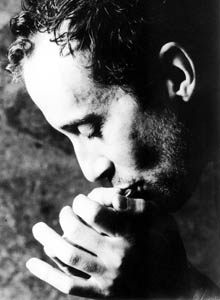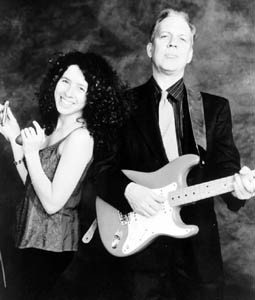![[Metroactive Music]](/gifs/music468.gif)
[ Music Index | North Bay | Metroactive Home | Archives ]
Blues Blowout
Festival gives voice to the humble harmonica
By
The average harmonica weighs only about four ounces. That's not what you'd call heavy, and it places the distinguished device among the smallest musical instruments on the planet. That said, there's nothing tiny about a harmonica's sound, which ranges from a mesmerizing intonation of diatonic complexity to an eardrum-shredding blast of wildly multitudinous chords and tones.
And yet, ever since its unexpected birth nearly two hundred years ago--reportedly around 1829 at the hands of either Sir Charles Wheatstone or Friedrich Buschmann, depending on your source--the humble harmonica has struggled to gain the kind of respect given to the flute, the piano, the guitar, and the fiddle. Only the accordion and the bagpipe have suffered similar public relations woes. Still, those instruments have long enjoyed their own high-profile music festivals.
"A lot of people look at the harmonica as a toy," states East Bay bluesman and harmonica virtuoso Mark Hummel. "The problem is, with a harmonica, the audience can't see what the player is doing, because unlike with a piano or a guitar, it's all being done in the harmonica player's mouth. The harmonica--like the blues--has always been given the back seat in the music business."
But things do change.
The blues themselves are enjoying a resurgence, and the harmonica is finally beginning to earn some respect as well. And thanks to Hummel, the harmonica has even been given its very own music festival.
For 11 years, Hummel has been staging an increasingly popular Bay Area event called the Blues Harmonica Blowout. In years past, Hummel has invited the Bay Area's reigning masters of the mouth organ to come out and strut their stuff. But this year's show marks a milestone for the event. For the first time, Hummel has arranged to bring in some of the best blues harmonica players from around the country and beyond. "This will be the most varied lineup I've ever had," Hummel says.
The show--which comes to the Last Day Saloon in Santa Rosa on Sunday, Jan. 13--will feature blues legend Snooky Pryor, one of the oldest living pioneers of the Chicago blues sound and one of the first blues players to amplify the harmonica.
Hummel himself will perform with his own band, the Blues Survivors. The bill also includes the great Sam Myers, Canadian phenom Carlos del Junco, Anson Funderburgh, and Sonoma County's own Norton Buffalo.
The show also boasts a rare California appearance by Annie Raines, the hot, young Boston-based harmonica player whom Hummel--and many fans and critics--ranks among the best blues harp players in the business.
"She kicks most guys' asses on the harp," Hummel says. "Seriously. Annie Raines is better than 85 percent of the other players out there." Noting that there are remarkably few women playing blues harmonica, Hummel says, "Women don't tend to gravitate to the blues the way men do. It's never had a big a female fan base. I don't know why.
"Maybe the guys aren't cute enough."
"I don't know why there are so few female harmonica players," says Raines, who makes her home in Boston and has burned a path through the blues world with her guitar-playing partner Paul Rishell, who will join her onstage at the festival.
Photograph by Eric H. Antonjou
Raines is looking forward to the Blues Harmonica Blowout, having heard colorful tales for years concerning Hummel's yearly extravaganza. She's especially anticipating a good time with the other performers, most of whom she's played with in the past. And she doesn't mind being the only woman on the bill.
"My grandmother played the harmonica," she says, citing her earliest influences. "My mother plays a little, though neither one was a professional musician. But I have to say that, growing up, I never felt like there was anything I couldn't do just because I was a female.
"All I know is the harmonica moves me strongly," she adds. "The minute I started playing it, I knew I never wanted to stop. Now, when I'm up on stage, if I'm doing my job, it doesn't matter if I'm male or female. The people in the crowd will be just as moved."
Raines has noticed that the blues has been attracting more and more young players. She predicts that an increasing number of women players--some with a similar love of the harmonica--will appear in the near future.
The blues, says Raines, is in the midst of a major renaissance.
"An even more sustained renaissance," she says, "than the one that took place in the sixties." As to why the blues is enjoying a resurgence of respect, Raines is less certain. "I really don't know," she says. "Maybe people are finally starting to get it now that everything on the radio has at least a little blues in it."
As for the new respect that seems to be growing for the long-suffering harmonica, Raines laughs as she says, "I hope that's true. It seems to be true. People have always loved or hated the harmonica. I like to just concentrate on the people who like it."
"It's a taste thing," says Hummel. "Harmonica is an acquired taste, and even the people who love harmonica have different tastes as to which kind of playing they like. Some people think Bob Dylan's a great harmonica player. I think he's pretty terrible. You can use the harmonica as an accompaniment to guitar as Dylan or Bruce Springsteen or Tom Petty do. Or you can use it as a solo instrument. I prefer the players who use it that way, who know how to make the harmonica sing.
"For me," he continues, beginning to sound like a kid at Disneyland, "people like Snooky Pryor and Sam Myers are my heroes. I've learned from them. I've inherited my love of the blues--and my love of the harmonica--from them."
Like Raines, Hummel foresees a powerful, worldwide re-energizing of the blues and looks forward to whatever the future brings to the art form.
"I've never seen the harmonica as prevalent in commercials and pop music as it's been in the last few years," he says. "Fortunately, there are more good harmonica players now than there have ever been."
[ North Bay | Metroactive Central | Archives ]
Copyright © Metro Publishing Inc. Maintained by Boulevards New Media.
![]()
 Humming Along: Canadian blues phenom Carlos del Junco brings his talented mouth to Santa Rosa on Jan. 13 for the Blues Harmonica Blowout.
Humming Along: Canadian blues phenom Carlos del Junco brings his talented mouth to Santa Rosa on Jan. 13 for the Blues Harmonica Blowout.
 Two of a Kind: Boston's Annie Raines and Paul Rishell blow into town for the harmonica festival.
Two of a Kind: Boston's Annie Raines and Paul Rishell blow into town for the harmonica festival.
The Blues Harmonica Blowout takes place on Jan. 13 at 5 p.m. at the Last Day Saloon, 120 Fifth St., Santa Rosa. Tickets are $25. 707.545.2343.
From the January 10-16, 2002 issue of the North Bay Bohemian.